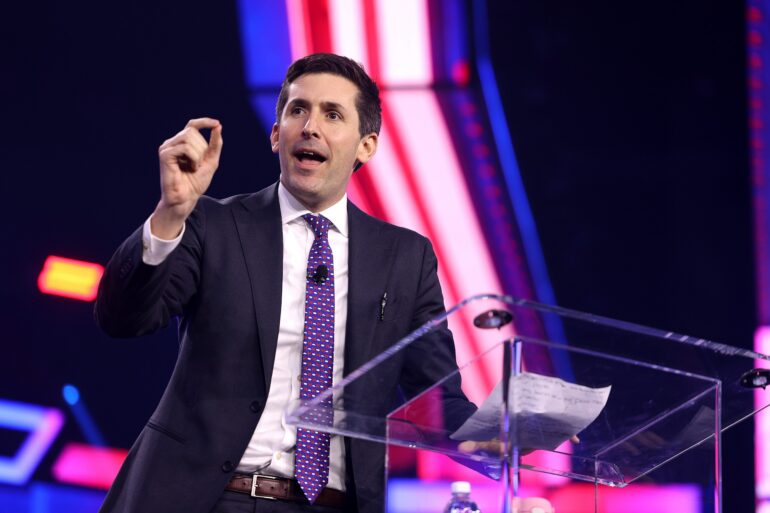Calley Means, a longtime confidant of Health Secretary Robert F. Kennedy Jr., is assuming a permanent post in the Trump administration, where he is expected to serve as a crucial conduit between Kennedy’s Make America Healthy Again movement and the broader MAGA coalition.
Means previously held a temporary role in the White House earlier this year. He has now been appointed a senior adviser at the Department of Health and Human Services, where he will work to advance the MAHA movement’s policy ambitions, according to individuals familiar with the appointment. In a statement, HHS confirmed that Means has joined the department as a “senior advisor supporting food and nutrition policy.”
Over the past year, the 40-year-old Means has become an increasingly visible advocate for Kennedy’s health agenda, appearing frequently on cable news and in policy discussions across Washington. He played a central role in securing Kennedy’s endorsement of Donald Trump last year and helped develop policy efforts regarding food dyes and the MAHA report released earlier this year. His sister, Dr. Casey Means, is Trump’s nominee for surgeon general.
One significant task ahead of him will be maintaining cohesion within the sometimes delicate MAHA-MAGA alliance. Some Kennedy-aligned influencers have voiced frustration with Kennedy’s support for weight-loss drugs and criticized White House chief of staff Susie Wiles for her previous lobbying ties.
During the presidential race—when Kennedy ran as an independent before endorsing Trump—Means pitched MAHA to the Trump campaign as a strategic way to broaden the MAGA coalition, according to people familiar with those discussions. “There would be no MAHA movement without Calley,” said Vani Hari, a wellness influencer known as the Food Babe.
Means has said he hopes MAHA becomes a permanent fixture within the Republican Party and has urged that the MAHA platform be integrated into GOP planning for the midterm elections. Speaking at the Heritage Foundation this summer, he remarked that MAHA’s success “does run through the political success of President Trump and Secretary Kennedy.”
His commitment to the movement deepened after the death of his mother from pancreatic cancer in 2021, an experience that pushed both him and his sister toward the wellness field. Means is now divesting from TrueMed, the company he co-founded in 2022, according to people familiar with the situation. A company representative confirmed he no longer has an active role there. TrueMed enables patients to obtain letters of medical necessity for items such as saunas, bicycles, and supplements, allowing them to use pre-tax health accounts to pay for them.
Means and his sister co-authored “Good Energy,” a bestselling book that argues ultraprocessed foods are central drivers of disease. The book circulated within Trump campaign circles before Kennedy endorsed Trump, with some aides informally referring to it as the “MAHA Bible.”
Katie Miller, a former White House aide and wife of deputy chief of staff for policy Stephen Miller, said she read the book and later met Means at the Florida home of Dr. Mehmet Oz, now head of the Centers for Medicare and Medicaid Services. She said Means has a talent for translating MAHA priorities into policy discussions. “He is the synthesizer to the White House,” she said. “He takes their big ideas and makes it into the process, procedure, that makes sense to the White House.”
Means has also clashed with farming and pesticide interests. He played a central role in crafting the initial MAHA report, which warned about widespread pesticide exposure, and the September MAHA strategy, which many saw as more restrained. Between those releases, he traveled with White House officials to farm visits and meetings with agricultural groups.
A vocal critic of GLP-1 weight-loss drugs, Means recently praised Trump’s agreement with drugmakers to lower their costs in an interview with Megyn Kelly. Still, he argued for a broader approach to improving public health. “Obesity is not a drug deficiency,” he said. “We have a spiritual crisis in this country.”
Means is expected to help steer revisions to U.S. dietary guidelines—anticipated to promote saturated fat and protein—and contribute to reforms of the Food and Drug Administration’s food ingredient standards.
Some of Means’s preferred wellness interventions have drawn criticism. Bob Goldberg, vice president of the Center for Medicine in the Public Interest, noted that while some are harmless, others—such as raw milk—carry risks. “If you want to give up fluoride toothpaste, fine, do it,” Goldberg said, referring to Means’s criticisms of fluoride. “If I were you, I would not drink raw milk.”
[READ MORE: Federal Judge Rejects Administration’s Challenge to New York Courthouse Arrest Restrictions]



